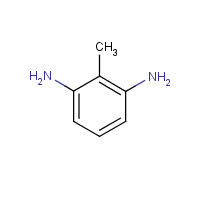2,6-Diaminotoluene
Agent Name
2,6-Diaminotoluene
CAS Number
823-40-5
Formula
C7-H10-N2
Major Category
Nitrogen Compounds

Synonyms
1,3-Benzenediamine, 2-methyl-; 2,6-Diamino-1-methylbenzene; 2,6-Toluylenediamine; 2,6-Tolylenediamine; 2-Methyl-1,3-benzenediamine; 2-Methyl-1,3-phenylenediamine; 2-Methyl-m-phenylenediamine; Toluene, 2,6-diamino-; Toluene-2,6-diamine; o-Toluene diamine; [ChemIDplus]
Category
Amines, Aromatic
Description
Colorless solid; Turns brown when exposed to air; [ICSC] White to brown solid; [MSDSonline]
Sources/Uses
Used as a chemical intermediate for toluene diisocyanate; in the production of polyurethane foam, elastomers, polyether polyols, dyes, and rubber chemicals; as a curing agent for epoxy resins; and as a monomer, chain extender, and crosslinker for polymers; [HSDB] Commercially available as 80:20 mixture of the meta (2,4 and 2,6) isomers; The commercial mixture may be represented by CAS #'s 25376-45-8 and 26966-75-6 (although these CAS #’s may also be used for other isomeric mixtures); [OECD SIDS] Meta-DAT (80:20 or 65:35 mixture of 2,4 and 2,6 isomers): Used to make urethane products, dyes, corrosion inhibitors, and rubber antioxidants; [INCHEM]
Comments
Exhibits the same genotoxic behavior in the Ames Salmonella assay as the 2,4 isomer, and both compounds are mutagenic with metabolic activation; Unlike the 2,4 isomer, which is a strong hepatocarcinogen, the 2,6 isomer produced no increase in tumor frequency in rodent bioassays; Emergency treatment: Methemoglobinemia; [HSDB] A skin, eye, and respiratory tract irritant; Can induce methemoglobinemia; May cause skin sensitization; Can be absorbed through skin; [ICSC] May cause skin sensitization; [eChemPortal: ESIS] Mutagenic; [RTECS] See "2,4-Diaminotoluene."
Biomedical References
Adverse Effects
Skin Sensitizer
Yes
Methemoglobinemia
MetHgb is secondary toxic effect
Hepatotoxin
Hepatoxic (a) from occupational exposure (secondary effect) or (b) in animal studies or in humans after ingestion
Reproductive Toxin
Yes
Diseases, Processes, and Activities Linked to This Agent
Diseases
Occupational diseases associated with exposure to this agent:
Processes
Industrial Processes with risk of exposure: